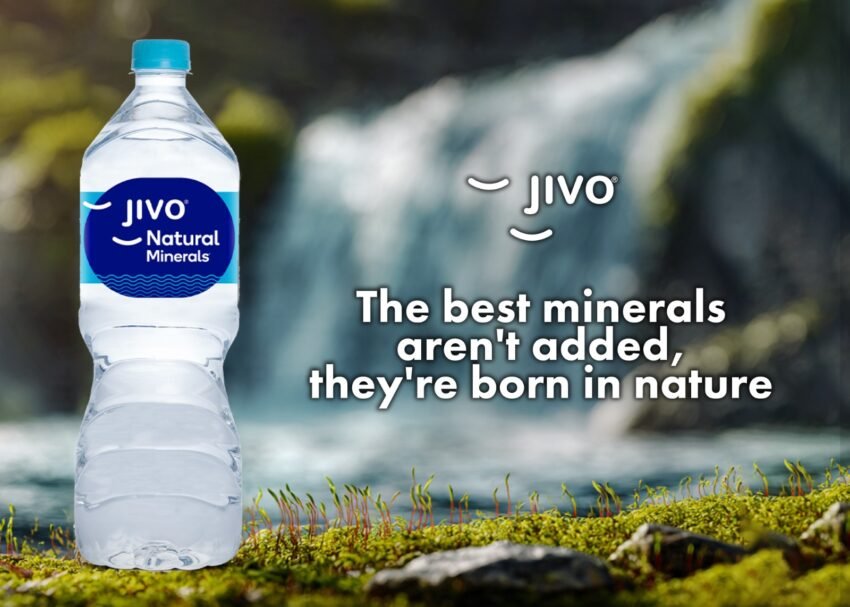Unknowingly, we often grab any mineral water to quench our thirst without knowing what’s inside. This quick pick is a common pattern followed by many in India. We hardly care to read the label or check the contents of mineral water. Does it carry any health-beneficial properties? This is the first question that should come to mind if we are health conscious. Picking the right mineral water brand should be our prime objective. But with so many brands on the shelves, it becomes quite challenging to make the right choice. That’s where the difference between natural minerals and added ones comes in. To help identify the best natural mineral water brand in India, and to learn the key differences between natural mineral and added mineral water, do read this informative blog.
What Are Minerals in Drinking Water?
Minerals are important components naturally found in drinking water. They are more than just added substances; they contribute to the water’s nutritional value. Common minerals include calcium, magnesium, potassium, and sodium. Each of these minerals supports important functions in the body.
Calcium supports the development and maintenance of strong bones and teeth. In India, where dairy consumption can sometimes be inconsistent, calcium in water can help meet daily requirements, especially for growing children and older adults.
Magnesium helps relax muscles and plays a role in regulating blood pressure, which is crucial in managing stress-related health issues. Potassium supports heart health and helps reduce blood pressure. Sodium helps maintain the balance of fluids in the body, preventing dehydration or swelling.
These minerals naturally occur in quality mineral water sources. Drinking water that contains these minerals can provide the body with essential nutrients in a simple and effective way. This is why many people prefer mineral water for its health benefits alongside hydration.
Defining Natural Mineral Water
Natural mineral water is water sourced directly from protected underground locations such as springs or aquifers. In India, many of these sources are found in regions like the Himalayas or other mountainous areas where rainwater naturally filters through rocks and collects minerals along the way.
What sets natural mineral water apart is its consistent mineral composition, which depends on the geology of its source. Unlike regular filtered water, natural mineral water is not stripped of its minerals and then artificially enhanced. Instead, it retains its original mineral balance and purity.
According to Food and drug administration (FDA, USA), natural mineral water must come from a protected source and contain at least 250 parts per million of minerals to qualify. The water must also be packaged close to the source under strict hygienic conditions without undergoing treatments that alter its essential mineral content.
This distinction matters because, in a country where water quality varies widely, knowing the origin and quality of your mineral water ensures safety and trust. Drinking the best natural mineral water means consuming water that is pure and naturally suited to support your health.
How Are Minerals Naturally Added?
Minerals are inorganic substances present in natural water. In some cases, minerals are added to water, while unprocessed and untreated natural water, such as that from underground springs and wells, contains minerals naturally.
When rain falls, it soaks into the ground and moves through layers of soil and rock. As the water travels, it picks up minerals like calcium from limestone and magnesium from volcanic soil.
This slow movement through underground layers can take years or even centuries. Because of this, the minerals dissolve in a way that makes them easy for the body to absorb, a quality called bioavailability. In regions like the Himalayas, water acquires the right balance of minerals from ancient rocks, coming out clear and rich in minerals. This water is known as natural mineral water and is best for drinking.
When you drink this water, those minerals enter your body and support various functions such as energy production and digestion. Natural mineral water generally feels lighter to the stomach and aids digestion, especially after a heavy meal. Compared to plain water, it has a balanced mineral content that makes it a healthy choice for daily hydration.
What Are Added Minerals?
Added minerals are introduced to purified water after it goes through extensive treatment, such as reverse osmosis, which removes almost all substances from the water, including minerals. To restore minerals and improve taste, companies add specific mineral salts like calcium carbonate or magnesium sulfate in carefully controlled amounts. This process helps ensure each bottle contains consistent mineral levels.
However, added minerals may not always dissolve or absorb as effectively as minerals naturally found in water. The body may treat them more like supplements rather than natural nutrients. Despite this, many consumers prefer mineralized water over demineralized water, which can taste flat.
When choosing mineral water brands in India, it is important to check whether the minerals are naturally occurring or artificially added, as this affects both taste and potential health benefits.
Steps in Bottling and Processing
Whether the water is natural mineral water or enhanced with added minerals, the bottling process focuses on maintaining safety and quality. For natural mineral water, the water is taken directly from the source and tested thoroughly to ensure purity. It undergoes gentle filtration methods such as sand filtration or UV treatment to remove germs, without altering the natural mineral content. Then, the water is bottled in a hygienic facility, sealed, and prepared for distribution.
In case of added minerals, the process usually begins with purification methods like reverse osmosis or distillation to remove impurities and minerals from city or groundwater. After purification, specific minerals are added back in controlled amounts, the pH is balanced, and the water is ozonated to keep it fresh.
Both types of bottled water follow the Bureau of Indian Standards (BIS) regulations, which include strict testing for contaminants like heavy metals and microorganisms.
Key Differences: Natural vs. Added Minerals
Understanding the difference between natural and added minerals can change how you experience mineral water. Natural mineral water has a subtle and clean taste, often described as fresh like a mountain breeze. Water with added minerals may taste flat or sometimes slightly salty.
An important factor is bioavailability. Minerals in natural water are naturally bonded with the water, making it easier for your body to absorb and use them effectively for bone and muscle health. Added minerals, on the other hand, may not be absorbed as well and can act more like supplements.
The source purity also sets them apart. Natural mineral water comes from protected springs, resulting in fewer contaminants. Water with added minerals depends on the original water source, which can be variable in quality.
Labelling provides clear guidance: natural mineral water must state its source and mineral content as it is, while added mineral water often uses terms like “mineralized” and may not provide detailed information.
In India, as awareness grows, consumers are leaning towards natural mineral water for its authentic taste and health benefits. These distinctions are essential when choosing the best option for daily hydration.
Reading Bottle Labels—What to Look For
Reading mineral water labels can be confusing, but knowing what to check helps you make a safe choice. First, look for the BIS IS:13428 certification mark. This is India’s official quality and safety standard for packaged natural mineral water. If the bottle does not have this mark, it is best to avoid it.
Next, check the source of the water. Labels that clearly mention specific sources, such as “Natural mineral water from Himalayan springs,” are more reliable than vague terms like “purified water.” Also, review the mineral content, aiming for a balanced level of calcium and magnesium, typically between 50 and 150 mg per litre.
Be cautious of terms like “remineralized” or “mineralized,” which indicate added minerals rather than naturally occurring ones. For natural mineral water, look for an untouched mineral profile. Additionally, check the pH value; a range of 7 to 8 is considered neutral and ideal. Total Dissolved Solids (TDS) below 500 mg per litre usually indicates a lighter and more pleasant taste.
In cities like Delhi and Bangalore, where counterfeit products may be present, it is safest to choose trusted brands that openly provide sourcing details and certification. These simple checks can help you select genuine, healthy mineral water every time.
Health Benefits of Natural Mineral Water
Switching to best natural mineral water offers several real health benefits. Calcium in the water works with vitamin D to support stronger bones and reduce the risk of osteoporosis, an important concern in urban India where more people lead sedentary lifestyles.
Magnesium helps calm the nervous system, lowers blood pressure, and relieves muscle cramps, making it beneficial after activities like yoga or a long commute. Potassium maintains electrolyte balance, helping to prevent dehydration during hot summers.
Research, including studies published in journals like BMC Public Health, links natural mineral water to better heart health and improved digestion. This is partly due to the presence of sulphates, which aid in digestive processes. Because minerals in natural water are better absorbed by the body, you get more benefits with each sip.
In a typical Indian diet consisting largely of rice and rotis, mineral water provides a convenient way to add essential nutrients. This is why top mineral water brands in India often highlight their mineral content—small changes that can help you feel more alert and steadier throughout the day.
Jivo’s Natural Mineral Water – Simply the Best
Jivo stands out among natural mineral water brands in India for its pure and untouched quality. Sourced from high-altitude Himalayan springs, Jivo’s water slowly filters through ancient rock layers, naturally gathering minerals like calcium and magnesium. There are no artificial additives—just pure mineral-rich water from nature.
What sets Jivo apart is its balanced mineral content, with total dissolved solids (TDS) around 200 to 300 mg/L, providing a smooth and refreshing taste without heaviness. It is non-carbonated and comes in eco-friendly, recyclable bottles. Jivo is also certified by the Bureau of Indian Standards (BIS), ensuring safety and quality.
Users often mention how well it hydrates, making it a great choice for physical activities, long drives, or daily hydration. Studies show its minerals have good bioavailability, supporting bone strength and heart health naturally.
For those looking for the best natural mineral water brands in India, Jivo’s focus on sustainability and purity makes it a top option. Drinking Jivo is like bringing the freshness of the Himalayas straight to your home.
Sip the Best Mineral Water in India
Choosing the right mineral water is about what your body needs. Whether you live in humid Kolkata or busy Hyderabad, natural minerals help keep your energy steady and support overall health.
The best natural mineral water in India is not always the most advertised but the one that offers purity and real benefits. Jivo Natural Mineral Water, sourced from Himalayan springs, gives you a refreshing taste with balanced minerals, fully certified for safety.
With Jivo, you enjoy natural hydration and support your wellness sustainably. Next time you’re shopping, choose Jivo and feel the difference of nature’s pure gift, sip after sip.


3 thoughts on “Natural vs. Added Minerals: What’s Best for You?”